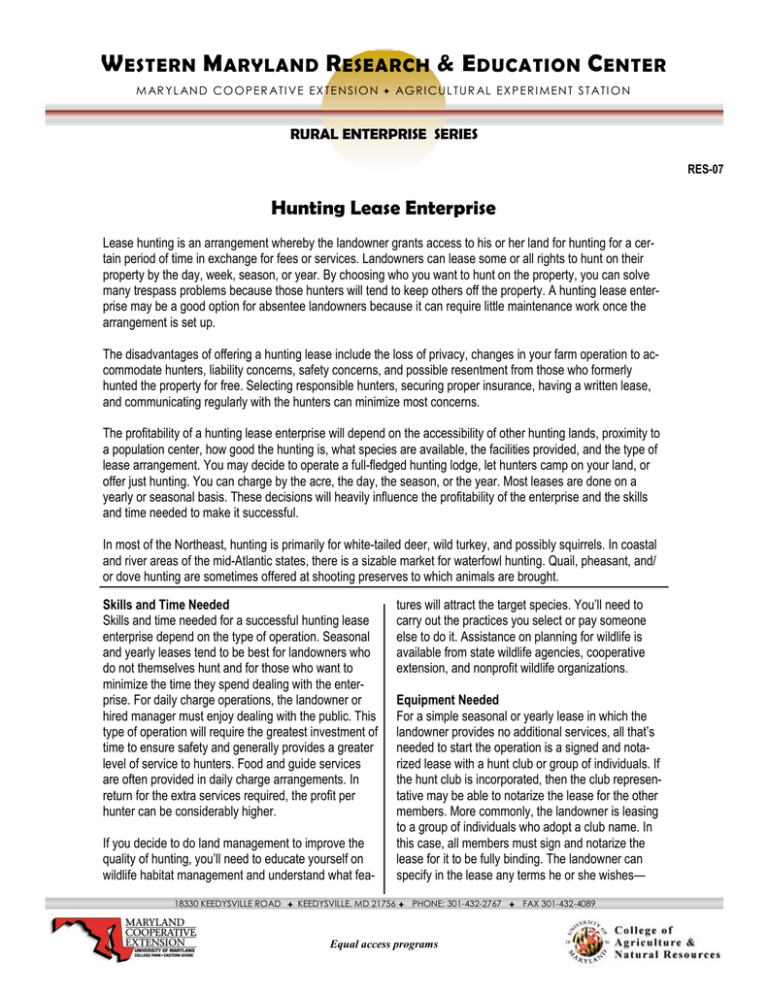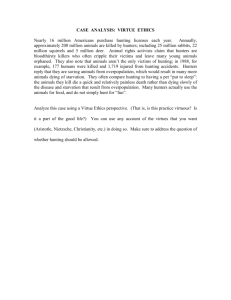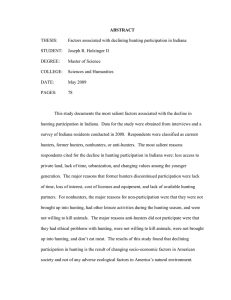W M Hunting Lease Enterprise ESTERN
advertisement

W ESTERN M ARYLAND R ESEARCH & E DUCATION C ENTER M AR Y L AN D C O O P E R ATI VE E X T E N S I O N ) AG R I CU L TU R AL E X P E R I M E N T S T ATI O N RURAL ENTERPRISE SERIES RES-07 Hunting Lease Enterprise Lease hunting is an arrangement whereby the landowner grants access to his or her land for hunting for a certain period of time in exchange for fees or services. Landowners can lease some or all rights to hunt on their property by the day, week, season, or year. By choosing who you want to hunt on the property, you can solve many trespass problems because those hunters will tend to keep others off the property. A hunting lease enterprise may be a good option for absentee landowners because it can require little maintenance work once the arrangement is set up. The disadvantages of offering a hunting lease include the loss of privacy, changes in your farm operation to accommodate hunters, liability concerns, safety concerns, and possible resentment from those who formerly hunted the property for free. Selecting responsible hunters, securing proper insurance, having a written lease, and communicating regularly with the hunters can minimize most concerns. The profitability of a hunting lease enterprise will depend on the accessibility of other hunting lands, proximity to a population center, how good the hunting is, what species are available, the facilities provided, and the type of lease arrangement. You may decide to operate a full-fledged hunting lodge, let hunters camp on your land, or offer just hunting. You can charge by the acre, the day, the season, or the year. Most leases are done on a yearly or seasonal basis. These decisions will heavily influence the profitability of the enterprise and the skills and time needed to make it successful. In most of the Northeast, hunting is primarily for white-tailed deer, wild turkey, and possibly squirrels. In coastal and river areas of the mid-Atlantic states, there is a sizable market for waterfowl hunting. Quail, pheasant, and/ or dove hunting are sometimes offered at shooting preserves to which animals are brought. Skills and Time Needed Skills and time needed for a successful hunting lease enterprise depend on the type of operation. Seasonal and yearly leases tend to be best for landowners who do not themselves hunt and for those who want to minimize the time they spend dealing with the enterprise. For daily charge operations, the landowner or hired manager must enjoy dealing with the public. This type of operation will require the greatest investment of time to ensure safety and generally provides a greater level of service to hunters. Food and guide services are often provided in daily charge arrangements. In return for the extra services required, the profit per hunter can be considerably higher. If you decide to do land management to improve the quality of hunting, you’ll need to educate yourself on wildlife habitat management and understand what fea- tures will attract the target species. You’ll need to carry out the practices you select or pay someone else to do it. Assistance on planning for wildlife is available from state wildlife agencies, cooperative extension, and nonprofit wildlife organizations. Equipment Needed For a simple seasonal or yearly lease in which the landowner provides no additional services, all that’s needed to start the operation is a signed and notarized lease with a hunt club or group of individuals. If the hunt club is incorporated, then the club representative may be able to notarize the lease for the other members. More commonly, the landowner is leasing to a group of individuals who adopt a club name. In this case, all members must sign and notarize the lease for it to be fully binding. The landowner can specify in the lease any terms he or she wishes— 18330 KEEDYSVILLE ROAD ) KEEDYSVILLE, MD 21756 ) PHONE: 301-432-2767 ) FAX 301-432-4089 Equal access programs archery or muzzle loader only, the number of hunters allowed at one time, maintenance of hunting rights for certain friends and family members, etc. You can even specify in the lease that the leaser must perform certain jobs, such as planting or mowing food plots. Check with your state’s wildlife management agency for applicable regulations and seasons. A sample lease is available on the Internet <www. naturalresources.umd.edu/Pages/ Hunting_Lease.html>. It may be helpful to have a qualified lawyer look over the lease before you offer it to hunters. a lease agreement, but this will not protect the landowner in the event of an accident. Special liability coverage is needed. Fortunately, a number of landowner associations and insurance companies offer reasonably priced insurance. A list of sources of liability insurance can be found on the Internet at <www.naturalresources.umd.edu/Pages/Insurance. html>. You may wish to check with your present insurance provider as well. Your state may require that you obtain a license for a fee hunting or hunting lease operation. Requirements will vary with the species. The costs are usually low, but penalties for not complying tend to be large. A special license may be needed to release and hunt pen-raised birds. A daily lease operation may require a building in which hunters can gather to receive instructions from the landowner or manager. Food, lodging, and guide facilities may be offered for daily and/or weekly arrangements. Some landowners may have existing cabins on the land that they allow hunters to use. This can be an additional source of income. Many hunting liability policies provide a reasonable level of protection for fire damage, but check the policy you select for the conditions that apply. For more information on budgeting for lodging facilities, see our vacation cabin publication (RES-09). If your customers will be mostly out-oftowners and you don’t plan to offer overnight accommodations, consider whether adequate overnight facilities and restaurants exist nearby to meet hunters’ needs. Marketing Concerns To avoid resentment from neighbors, relatives, friends, and others who may have been hunting on the property, you may wish to offer them the opportunity first to lease the land. Absentee landowners must be especially concerned with this because vandalism can occur while they are away. You could try marketing your hunting lease rights through local sporting associations. County Cooperative Extension or state wildlife management agencies should be able to provide some contact information for these groups. You might place ads in sporting magazines or the sports section of local newspapers. Waterfowl hunting will probably require the construction of blinds, and tree stands may be necessary for deer hunting. You can do habitat improvement such as timber cutting, planting, and mowing to increase the number or diversity of animals your land will support. The largest amount of time spent in managing a hunting lease operation is in selecting a hunt club or individuals who will respect your property and your objectives. It is best first to do phone interviews to ask specific questions that are important to you. Check the references that potential leasers provide. You can then meet a few likely candidates at the property and make your decision. Once selected, cultivate a good working relationship with the group that can last years and require minimal effort. Liability and Licensing Concerns Each state has recreational statutes that minimize liability for landowners who allow individuals to hunt on their property at no charge. The statutes vary by state, but none of these statutes apply when you charge a fee. General farm insurance usually does not cover fee hunting or hunting leases in which a fee is charged. This is considered a business relationship, so special coverage is needed. Many landowners require hunters to sign a liability waiver as part of If you have an elaborate operation, you may want to develop an attractive brochure or make a video to display at hunting shows and to send to interested individuals. You’ll need letterhead and envelopes and probably a logo to market your business. 2 Some hunting preserves promote their businesses as year-round family fun places. They stage frequent seasonal events for members’ families, such as hayrides and barbeques. This fosters goodwill among the hunters and their families and can increase hunter loyalty to the preserve. keting and telephone, the enterprise netted $440. If the owner had invested in tree stands or wildlife planting, the income would have been less, but the fee per acre may have been higher. Many landowners work out agreements with hunters to plant food plots and maintain roads and fences. You may decide to allow hunters to provide their own tree stands, but you should specify in the lease that they not damage your better timber trees. What to Charge? It can be difficult to find published information on the going price for hunting leases. Prices for a yearly lease for deer and turkey commonly range from $3 to $10 per acre. Waterfowl leases may bring in thousands of dollars if it is a prime location. What you charge will depend on how the lease is structured and if the land is actively managed, i.e., with food plots, tree stands, blinds, and many other factors. One way to find out is to talk with other landowners in the area who lease their land. Members of forest landowners associations and other agricultural associations will commonly share their experiences. Look in the paper and magazines and call other ads to see what others are asking. Hunting lease income on a yearly basis typically will pay the property taxes and then some. This is very attractive to many landowners. When you look at the amount of money generated over 20 years, you may find that the income from a hunting lease is worth more than periodic income from timber harvests. Hunting lease operations are widely variable in charges, sources of revenue, and extent of services. The enterprise can be as plain or as fancy as you wish. Just remember that hunters are more likely to judge the experience by the quality of the hunting than by the quality of the lodge. Financial Picture The budget that follows is for a year-long lease on deer and turkey hunting rights on a 70-acre parcel at a rate of $7 per acre. Except for minor costs for marInformation Resources Jones, W.D., I.A. Munn, S.C. Grado, and J.C. Jones. 2001. Fee Hunting: An Income Source for Mississippi’s Non-Industrial, Private Landowners. Forest and Wildlife Research Center. Mississippi State University. www.cfr.msstate.edu/fwrc/feehunting.pdf. ings. Clemson University Cooperative Extension Service, Clemson, SC. Yarrow, G.K. 1998. Developing a Hunting Lease: Considerations, Options, and Realities. In: J.S. Kays et al., eds. Natural Resources Income Opportunities for Private Lands conference proceedings. University of Maryland Cooperative Extension Service, College Park, MD. (Order through www.nraes.org/ publications/nraes140.html.) Kays, J.S. 1997. Recreational Access and Landowner Liability in Maryland: Guidelines for Managing Free or Fee Access. Extension Bulletin 357. University of Maryland Cooperative Extension Service, College Park, MD. Cost $2.50. (Order through www. agnr.umd.edu/MCE/Publications/Category.cfm? ID=8.) Selected sources of liability insurance for hunt clubs and other recreational enterprises. Developed by Maryland Cooperative Extension in Spring 2000. www.naturalresources.umd.edu/Pages/Insurance. html. Pike, J. 2001. Alternative Agriculture: Can Fee Hunting Increase Your Bottom Line? Rural Enterprise and Alternative Development Initiative Report No. 2. Southern Illinois University-Carbondale. www.siu. edu/~readi/grains/factsheets/hunting.pdf. Authors Jonathan S. Kays, Regional Extension Specialist, Natural Resources Yarrow, G.K. and D.C. Guynn, Jr. 1989. Fee Hunting on Private Lands in the South, symposium proceed3 HUNTING LEASE ENTERPRISE BUDGET Property size Lease time frame Species Number of hunters Land use INCOME Lease Cabin rental for season, year, etc Total VARIABLE COSTS Food plot (labor & seed) Marketing (newspaper-magazine ad) Phone Tree stand (labor/material) Lawyer review Insurance (if not paid directly by club) Total variable costs Annual net income over variable costs $/acre 7 0 70 1 year deer, turkey, squirrel 4 50 acres forested, 20 in agriculture $/year 490 0 490 UNIT AMOUNT PRICE acre 3 0 1 30 1 month 1 20 stand 0 0 0 100 TOTAL COST ($) 0 30 20 0 0 50 $440 P 5/2003 4



